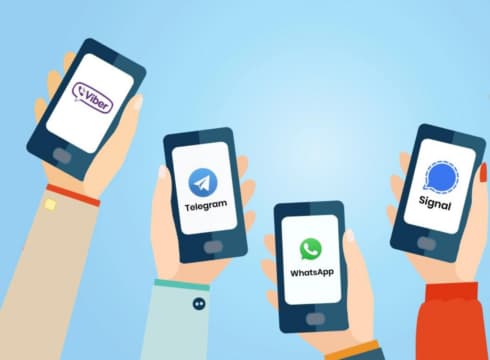Industry calls for a ‘forward looking’ telecom regulatory framework to address the requirements of the convergence of various digital services
The current scenario allows OTT applications to offer voice, data, and video services over a single broadband platform with or without spectrum: COAI
The proposed new telecom regulatory framework is expected to be put in the public domain for feedback in the coming days: Report
Inc42 Daily Brief
Stay Ahead With Daily News & Analysis on India’s Tech & Startup Economy
Batting for a level-playing field, telecom players have urged the Department of Telecommunications (DoT) to regulate over-the-top (OTT) communication apps such as WhatsApp, Telegram and Signal.
The development came to pass in a clutch of submissions made by industry bodies to DoT during consultations on a proposed new telecom regulatory framework. According to the Economic Times, the draft Bill is expected to be put in the public domain for feedback in the coming days.
The industry reportedly called for a ‘forward looking’ law that addresses the requirements of the convergence of various digital services – telecommunication, broadcast and OTT communication services.
Training its guns on OTT communication apps, the Cellular Operators Association of India (COAI) noted that the increasing deployment of digital technologies has led to market convergence and ‘intermodal’ competition. The industry body rued that the current scenario has led to OTT applications increasingly offering voice, data, and video services over a single broadband platform with or without spectrum.
Citing blurred lines between broadcasting and telecom networks, the industry representatives sought a converged law for various technologies and platforms.
“We, therefore, submit that the outcome of this consultation process should result in the development of converged law and regulation for telecommunications (both terrestrial and satellite communication), broadcasting and IT and shall also address the legal and regulatory issues related to data privacy and related security issues,” the COAI was quoted as saying.
Besides, the industry body also called for charging licence fees only towards administrative expenses and urged the government to slash it to around 0.5%-1% of the adjusted gross revenue (AGR) from the current 3% .
OTT Apps: The Thorn In Telcos’ Flesh
Telecom operators have been at loggerheads with OTT communication apps for a long time. Voice and messaging services have been key revenue generators for telecom players since their heydays, but have plummeted to record lows owing to the rising usage of OTT communication apps.
OTT apps provide free audio and video calling at the supposed expense of telcos, leaving only data revenue in the kitty of telecom operators. Another bone of contention appears to be the heavy licensing regime prevalent for telecom companies. While telcos have to acquire spectrum licences and deploy heavy capital expenditure to provide services, OTT apps such as WhatsApp and Telegram can just provide those services without any permit or overseeing authority.
Last month, the DoT sent a reference to the Telecom Regulatory Authority of India (TRAI) and began consultations on the regulation of OTT communication apps. These proceedings were part of wider deliberations to prevent the misuse of the technology in an evolving digital landscape.
Interestingly, this comes at a time when authorities have tightened their screws around social media platforms in the recent months. Earlier on Wednesday, the Centre told the Delhi High Court that it would introduce a framework to regulate social media platforms ‘at some point in time’.
Earlier today, the Minister of State (MoS) for Electronics and Information Technology Rajeev Chandrasekhar said that the final version of the IT Rules, 2021 with the new data norms is set to be unveiled soon.
This adds to the growing set of problems for OTT communication apps and social media platforms. While India is a huge market, regulatory overreach could play a spoilsport for these companies. Despite this, India continues to be a huge market for these apps as both WhatsApp and Telegram count India as its biggest market across the globe.
{{#name}}{{name}}{{/name}}{{^name}}-{{/name}}
{{#description}}{{description}}...{{/description}}{{^description}}-{{/description}}
Note: We at Inc42 take our ethics very seriously. More information about it can be found here.


